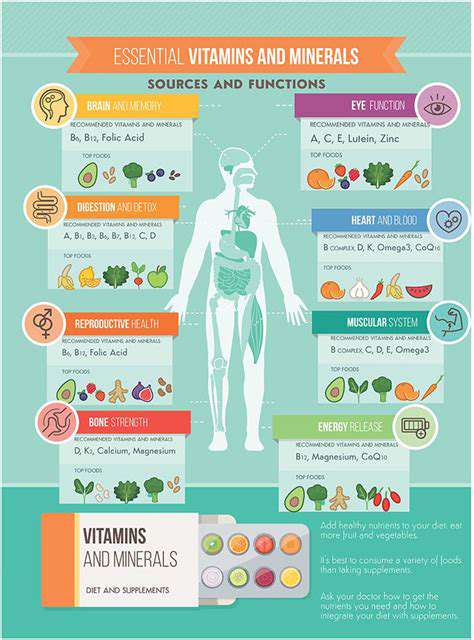Understanding Food Labels: What to Look For and Avoid

Understanding Caloric Needs
Determining your daily caloric needs is crucial for achieving your fitness goals, whether it's weight loss, weight gain, or simply maintaining your current weight. This calculation takes into account several factors, including your basal metabolic rate (BMR), activity level, and overall lifestyle. Understanding your BMR, the amount of energy your body burns at rest, is essential to accurately estimate your total daily energy expenditure (TDEE). Factors like age, sex, height, and weight all play a role in determining your BMR, highlighting the personalized nature of caloric requirements.
While online calculators can provide a general estimate, consulting with a registered dietitian or nutritionist can offer a more tailored and comprehensive approach. They can help you understand your specific needs and create a personalized nutrition plan that aligns with your goals and health status. This personalized approach ensures that you're consuming the right amount of calories to support your body's functions and desired outcomes.
Macronutrients: The Building Blocks
Macronutrients are the essential components of your diet that provide the energy your body needs to function. These include carbohydrates, proteins, and fats. Each plays a vital role in various bodily processes, from building and repairing tissues to providing energy for physical activity. Carbohydrates are the primary source of energy for the body, and proteins are crucial for building and repairing tissues. Fats are essential for hormone production, nutrient absorption, and insulation.
Carbohydrates: Fueling Your Body
Carbohydrates are a significant source of energy for the body. Simple carbohydrates, like sugars, are quickly digested and provide a rapid energy boost. Complex carbohydrates, found in whole grains, fruits, and vegetables, are digested more slowly, providing a sustained release of energy. A balanced intake of both simple and complex carbohydrates is essential to maintain stable blood sugar levels and prevent energy crashes. This balanced intake is critical for sustained energy throughout the day.
Choosing complex carbohydrates over simple ones is often recommended for sustained energy. These complex carbohydrates provide a more gradual release of energy, helping you maintain stable blood sugar levels and avoid energy slumps.
Proteins: Building Blocks of Life
Proteins are essential for building and repairing tissues throughout the body. They are involved in countless bodily functions, from hormone production to immune response. Protein-rich foods include lean meats, poultry, fish, eggs, dairy products, and legumes. Adequate protein intake is crucial for muscle growth, repair, and maintenance. Proper protein intake is vital for maintaining healthy muscles and overall well-being.
Fats: Essential for Health
Fats are often misunderstood, but they are essential for various bodily functions, including hormone production, nutrient absorption, and maintaining healthy cell membranes. Unsaturated fats, found in avocados, nuts, and olive oil, are generally considered healthier than saturated fats, which are often found in processed foods and red meat. A balanced intake of different types of fats is important for optimal health. The right balance of fats is essential for overall health and well-being.
Macronutrient Ratios: Finding the Right Balance
The ideal macronutrient ratio can vary depending on individual needs and goals. There is no single perfect ratio, as it's vital to consider personal factors like activity level, body composition, and overall health. Consulting a registered dietitian or nutritionist can help you determine the optimal macronutrient ratios for your specific needs. Understanding and adjusting your macronutrient ratios can significantly impact your health and fitness journey. Adjusting these ratios can profoundly affect your body composition and overall health outcomes.
Vitamins and Minerals: Essential Nutrients

Vitamins for Energy Production
Vitamins play a crucial role in numerous bodily functions, including energy production. Certain B vitamins, like thiamin (B1), riboflavin (B2), and niacin (B3), are essential components of metabolic pathways that convert food into usable energy. These vitamins work together to release energy from carbohydrates, fats, and proteins, ensuring that your body has the fuel it needs to function properly throughout the day. A deficiency in these crucial vitamins can lead to fatigue and reduced energy levels.
Minerals for Bone Health
Minerals are equally important for various bodily functions, and calcium and phosphorus are vital for maintaining strong and healthy bones. Calcium is the primary structural component of bones, while phosphorus plays a crucial role in bone mineralization. Adequate intake of these minerals is essential during growth spurts and throughout life to prevent conditions like osteoporosis. A balanced diet rich in calcium-rich foods like dairy products, leafy greens, and fortified foods, combined with sufficient phosphorus intake, is vital for optimal bone health.
Importance of Antioxidants
Antioxidants are crucial for protecting the body against damage from harmful molecules called free radicals. Free radicals can accumulate in the body due to various factors like pollution, stress, and even normal metabolic processes. These unstable molecules can damage cells and contribute to the aging process and various health issues. Vitamins like vitamin C and E, along with minerals like selenium, act as potent antioxidants, neutralizing free radicals and protecting cells from oxidative stress.
Vitamins for Immune Function
Vitamins and minerals also play a vital role in supporting a healthy immune system. Vitamin C, for instance, is known for its antioxidant properties and its ability to stimulate the production of white blood cells, which are essential components of the immune system. Vitamin A and zinc are also important for immune function, ensuring the body can effectively fight off infections and maintain overall health.
Minerals for Fluid Balance
Maintaining proper fluid balance is essential for various bodily functions, and minerals like sodium and potassium play a crucial role in this process. Sodium helps regulate fluid volume, while potassium assists in nerve function and muscle contractions. An imbalance in these minerals can lead to various health issues, highlighting the importance of consuming a balanced diet that provides adequate amounts of these essential minerals.
Role in Cellular Growth and Repair
Vitamins and minerals are involved in numerous cellular processes, including growth and repair. Vitamin D, for example, is essential for calcium absorption, which is critical for building and maintaining healthy bones and teeth. Furthermore, various B vitamins participate in DNA synthesis and cell division, contributing to healthy cell growth and repair. A deficiency in these crucial nutrients can hinder these processes, impacting overall health and well-being.
Vitamins and Minerals for Energy Metabolism
Several vitamins are essential for energy metabolism, helping the body convert food into usable energy. These vitamins are critical for cellular processes and overall health. Riboflavin (B2) and niacin (B3) are two important examples, working together to release energy from carbohydrates, fats, and proteins. Adequate intake of these vitamins is crucial for optimal energy levels and overall well-being.
- Decadent Chocolate Chip Cookies: The Secret to Perfect Chewyness
- Storing Rice and Grains: Pantry Best Practices
- Authentic Greek Salads: Fresh and Flavorful
- High Protein Breakfast Ideas: Fuel Your Day
- Authentic Irish Stew: Hearty and Comforting
- Baking with Alternative Flours: Gluten Free and Beyond
- Keto Desserts: Guilt Free Sweet Treats
- Kitchen Hacks for Meal Prep: Save Time
- Speedy Weeknight Dinners: 15 Minute Chicken Stir Fry
- Baking Tips and Tricks: Achieve Perfection
- Cooking with Spices: A Beginner's Flavor Guide
- Quick & Easy Stir Fries: Healthy and Delicious